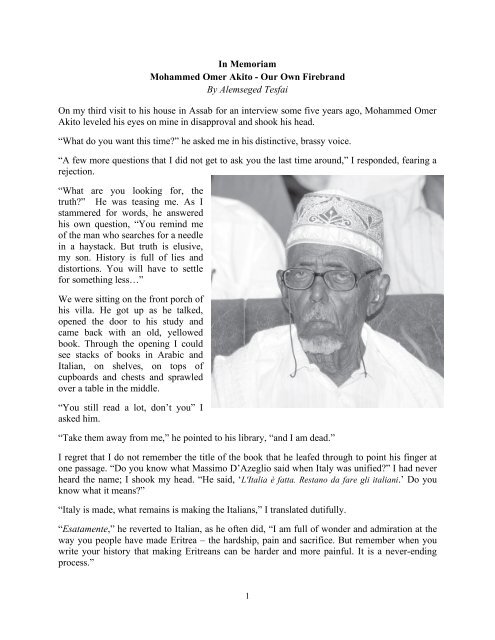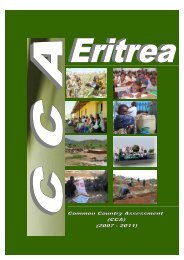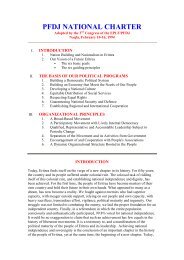In Memoriam Mohammed Omer Akito - Our Own Firebrand
In Memoriam Mohammed Omer Akito - Our Own Firebrand
In Memoriam Mohammed Omer Akito - Our Own Firebrand
You also want an ePaper? Increase the reach of your titles
YUMPU automatically turns print PDFs into web optimized ePapers that Google loves.
<strong>In</strong> <strong>Memoriam</strong><br />
<strong>Mohammed</strong> <strong>Omer</strong> <strong>Akito</strong> - <strong>Our</strong> <strong>Own</strong> <strong>Firebrand</strong><br />
By Alemseged Tesfai<br />
On my third visit to his house in Assab for an interview some five years ago, <strong>Mohammed</strong> <strong>Omer</strong><br />
<strong>Akito</strong> leveled his eyes on mine in disapproval and shook his head.<br />
“What do you want this time?” he asked me in his distinctive, brassy voice.<br />
“A few more questions that I did not get to ask you the last time around,” I responded, fearing a<br />
rejection.<br />
“What are you looking for, the<br />
truth?” He was teasing me. As I<br />
stammered for words, he answered<br />
his own question, “You remind me<br />
of the man who searches for a needle<br />
in a haystack. But truth is elusive,<br />
my son. History is full of lies and<br />
distortions. You will have to settle<br />
for something less…”<br />
We were sitting on the front porch of<br />
his villa. He got up as he talked,<br />
opened the door to his study and<br />
came back with an old, yellowed<br />
book. Through the opening I could<br />
see stacks of books in Arabic and<br />
Italian, on shelves, on tops of<br />
cupboards and chests and sprawled<br />
over a table in the middle.<br />
“You still read a lot, don’t you” I<br />
asked him.<br />
“Take them away from me,” he pointed to his library, “and I am dead.”<br />
I regret that I do not remember the title of the book that he leafed through to point his finger at<br />
one passage. “Do you know what Massimo D’Azeglio said when Italy was unified?” I had never<br />
heard the name; I shook my head. “He said, ‘L'Italia è fatta. Restano da fare gli italiani.’ Do you<br />
know what it means?”<br />
“Italy is made, what remains is making the Italians,” I translated dutifully.<br />
“Esatamente,” he reverted to Italian, as he often did, “I am full of wonder and admiration at the<br />
way you people have made Eritrea – the hardship, pain and sacrifice. But remember when you<br />
write your history that making Eritreans can be harder and more painful. It is a never-ending<br />
process.”<br />
1
He had a way of disarming people not only with his penetratingly unflinching eyes, but also with<br />
his brilliant wit and unreserved and uncensored opinions on any issue that he tackled. It is little<br />
wonder that his colleagues, friends and even enemies alike, stood in awe of him throughout his<br />
life as an active politician. Remarkably, not one of the dozens of figures from that time with<br />
whom I have spoken had anything negative to say about him. One of his greatest political<br />
enemies, the former Chief Executive of Eritrea, Asfaha Weldemichael, said in an interview in<br />
1996, “<strong>Akito</strong>? esat, defar, neQax’yu znebere” (“<strong>Akito</strong> was a firebrand, bold and intractable.”)<br />
Born in 1919 in Assab, <strong>Akito</strong> went to an Italian school there and finished his studies – 4 th Grade<br />
being the highest limit for Eritreans – in 1934. At the age of fifteen, he joined the Commissariato<br />
of Denkalia as a clerk. <strong>In</strong> 1939, he became an interpreter in the shipping offices of Societa<br />
Anonima Navigazione Eritrea at Sana’a, Yemen. The experience encouraged him to set up his<br />
own commercial activity in 1944, between Eritrea, Yemen and beyond. It was at the beginning of<br />
his lifelong and successful career in business that he entered Eritrean politics in the late 1940’s.<br />
“Almost every young Muslim of your background joined the Moslem League of Eritrea (MLE),<br />
why did you join the Pro-Italy Party instead?” I asked him in one of our series of interviews.<br />
“I did not join Pro Italia. I was one of its founders. I set it up in Denkalia,” he replied, “You see,<br />
the Italians first set foot here in Assab before they moved north to conquer Massawa, Asmara,<br />
Keren and the rest. Assab was the springboard for their conquest of Eritrea and even Somalia.<br />
And what did they do? They totally neglected this area and developed the other places; they<br />
linked them by road and rail, modernized them and all. I wanted Italy back in Eritrea as a trustee<br />
in order to make it dispense with its obligation and rectify the neglect.” I could see that he still<br />
felt strongly about the injustice as he sighed and added, “It did not happen that way…”<br />
<strong>In</strong> 1952, <strong>Akito</strong> was unopposed when he succeeded in his bid to become a member of the First<br />
Legislature of the Eritrean Assembly. It did not take him long to establish himself as a fierce<br />
fighter for Eritrea’s rights under its federal status with Ethiopia. Along with several young<br />
dissenters like himself, he became an uncompromising critic of the Unionist plans and<br />
maneuvers of both the Eritrean and Ethiopian authorities. He also had the broadness of mind to<br />
make alliances with fair-minded Unionists starting to harbour doubts about Ethiopian intentions.<br />
The list of his accomplishments and activities inside the Assembly would be too long to detail<br />
here. But when the Tedla Bairu Administration was rocked by a corruption scandal a few months<br />
into its short life, he called for justice and retribution. When the Voice of Eritrea newspaper was<br />
shut down by executive order and its editors imprisoned, he fought for its reinstatement and the<br />
release of the editors. He vehemently opposed Emperor Haileselassie’s consistent interventions<br />
in internal Eritrean affairs and was at the forefront of the resolution to condemn that<br />
highhandedness in 1954. He was, indeed, a thorn on the Ethiopian and Unionist side and they<br />
could not wait for the chance to silence or eliminate him.<br />
That chance came one day in August 1955 when the Assembly convened to elect a new Chief<br />
Executive. The first CE, Tedla Bairu, had resigned earlier in July. When <strong>Akito</strong> came into the<br />
halls of the Assembly that day, one of the former Unionists, Bemnet Tessema, took him aside.<br />
“Bemnet told me that the Ethiopian Government was putting up its own man, Asfaha<br />
Weldemichael, the Vice Representative of the Emperor, to replace Tedla. ‘If Asfaha is elected<br />
2
today,’ he said to me, ‘The Federation is lost. I will put Haregot Abbay on the ballot to oppose<br />
Asfaha. Will you second me?’ Frankly, I was never fond of Haregot, never felt comfortable with<br />
him. But for the safety of the Federation, I preferred him over Asfaha. So I agreed.”<br />
As promised, <strong>Akito</strong> seconded Bemnet’s nomination of Haregot. This move had not been<br />
expected, as the authorities had wanted Asfaha to sail through unopposed. “The Vice President<br />
of the Assembly, the priest Dimetros, was sitting right in front of me,” he reminisced, “He had a<br />
dark complexion and wore a black robe with a black overcoat on top. I saw him getting visibly<br />
angry, even darker in the face. I knew from that moment that my days in the Assembly were<br />
numbered.”<br />
<strong>In</strong> the 1956 elections for the Second Legislature, <strong>Akito</strong> was declared the hands down winner over<br />
his government sponsored rival. Before he could resume in his seat, however, CE Asfaha<br />
declared the election null and void for a purported irregularity and called for a special election to<br />
determine a “true winner” in the constituency. <strong>Akito</strong> immediately took his case to the Supreme<br />
Court of Eritrea where cases involving the Executive were adjudicated. <strong>In</strong> a landmark decision,<br />
the bench chaired by Chief Justice Sir James Shearer struck down Asfaha’s “null and void”<br />
claim and reinstated <strong>Akito</strong> as the undisputed winner.<br />
But Asfaha would not abide by the Court’s decision and, in an unconstitutional move, he found a<br />
flimsy procedural excuse to coerce the Assembly members to vote on whether <strong>Akito</strong> should be<br />
allowed to return to his seat. Seven members supported <strong>Akito</strong>. The rest voted for his dismissal.<br />
“And you stayed out, end of story?” I asked him.<br />
“I stayed out yes, but not end of story. I had the court order in my hand. I was the lawful<br />
Representative. So I denied Asfaha the opportunity to replace me by his handpicked supporter.”<br />
“But how?”<br />
“First, I refused to seek or accept other employment. I also let other people run my business in<br />
Assab. Second, I refused to leave Asmara. Third, every time that the Assembly was in Session, I<br />
took my court decision with me and attempted to take my seat, only to be blocked at the gate on<br />
each attempt. If I had absented myself from this routine, it would have been interpreted as<br />
submission to their will and they would have gone ahead with a by election to replace me. As it<br />
was, Asfaha did not dare to openly reject a Supreme Court decision. My seat remained empty<br />
throughout”<br />
Unsalaried, unemployed, living in a little room behind the Great Mosque of Asmara and, above<br />
all, hounded by the Government’s spies, <strong>Akito</strong> literally “occupied” his Assembly seat from the<br />
streets. By his reckoning, it was the most difficult and most testing period of his life. But, at<br />
least, he won that particular battle against Asfaha and a submissive Assembly that would deny a<br />
fellow member his legitimate seat.<br />
His “term” ended in 1960 when general elections for the Third Legislature were called. This<br />
time, he let it pass by and was ready to return to Assab and his business after four years of a<br />
principled stand-off against the mighty of the day. But Asfaha had not done with him just yet.<br />
<strong>Akito</strong> in Assab would have been a force to reckon with. He thus appointed him to a minor post at<br />
3
the Government Printing Press in Asmara, where he languished for many years as a virtual exile.<br />
It was during this period that he uttered one of the most quoted and telling phrases of the time.<br />
I asked him about it.<br />
“I was walking to my office one morning and someone asked me, ‘How are you, <strong>Akito</strong>?’ I<br />
replied, ‘Sopra i malati, ma sotto I matti,’ meaning, ‘Above the sick, but below the mad.’ You<br />
see, the Printing Press was in the middle of the Forto Hill, right above the hospital Regina Elena<br />
for the physically sick, and below St Mary’s Hospital on top of Forto for the mentally ill – above<br />
the sick, below the mad. People identified their own individual situations with the figurative<br />
meaning of what I said. It became a common answer to a common question.” He laughed<br />
pensively.<br />
It took more than principle to be an <strong>Akito</strong>. It also took a high personal moral standard of which<br />
he undoubtedly had quite a reserve. My lasting image of him will always be that day when I saw<br />
him at the Sembel Hospital in Asmara stooping tenderly over his ailing wife of many, many<br />
years. I could see that the fiery <strong>Akito</strong> had a soft spot deep inside his soul. It was a heart-warming<br />
scene.<br />
Farewell <strong>Akito</strong>, our own <strong>Firebrand</strong>.<br />
4





